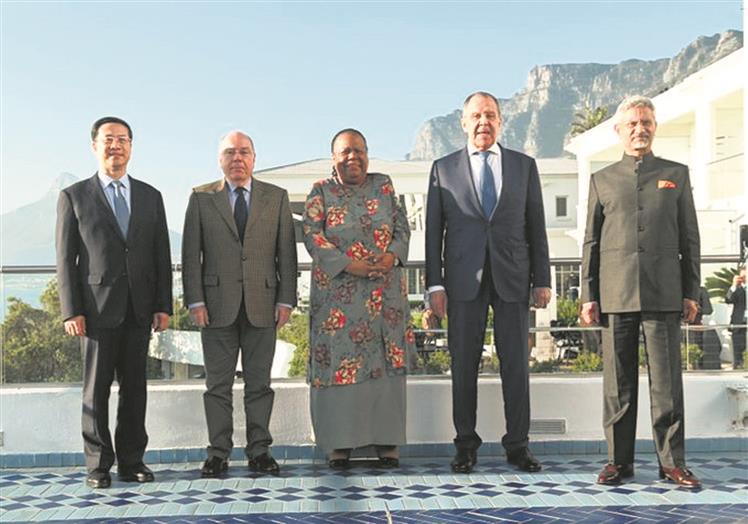Preventing Chinese hegemony in expanded BRICS
- July 6, 2023
- Posted by: admin
- Category: China

India seeks genuine multilateralism. The diminishing of Russian power has been detrimental to Indian objectives.


Gurjit Singh
Former Ambassador
THE recent meeting of BRICS foreign ministers in Cape Town, South Africa, refocused on the alternative to growing western consolidation against Russia and China.
The five-member BRICS, comprising Brazil, Russia, India, China and South Africa, provides an alternate development model but is mired in emerging bipolarity. China, which dominates the Shanghai Cooperation Organisation (SCO), is also seeking to dominate the BRICS and making it a body that can challenge the West.
While BRICS has a full agenda, particularly in the post-pandemic era and amid the Ukraine war, the foreign ministers’ meeting focused on BRICS expansion and the move towards a so-called common currency. Both these are Chinese-led efforts backed by Russia to bring greater heft to BRICS by weaning away middle powers who are often friends of the US as well. It is also an effort to strike against US-led sanctions by encouraging economic engagement in non-dollar currencies.
For India, the main challenge is to prevent Chinese domination of BRICS. India is laying emphasis on its own agenda. This seeks genuine multilateralism in the world through a reform of the UN, particularly the Security Council. India aims to keep BRICS aligned against terrorism in all its manifestations. While China pays lip service to these ideas, it tries to push them lower on the agenda and accept them tangentially.
On the reform of the UN Security Council, for instance, China never speaks about having more permanent members. As far as terrorism is concerned, Beijing is in agreement with other nations in principle, but in practice, it blocks references to Pakistan-based terrorists in UN committees.
Rather than become an alternative development model by using the resources of the New Development Bank (NBD), BRICS is being pushed by China with tacit Russian support to expand the group of countries who will oppose the US-centric global perspective and follow Chinese tenets of use of international institutions favouring China. On these, India often has no difference of opinion, but it is in the intent that there is divergence.
Ideally, BRICS should have balanced itself against Chinese hegemony by reviving the spirit of the India-Brazil-South Africa (IBSA) grouping, which predated BRICS. Had the IBSA spirit worked, then China and Russia would not have held sway over BRICS. Instead of the IBSA spirit, divergent reactions from South Africa and Brazil have emerged.
Brazil is hedging its bets. South Africa promised to be the flagbearer of Africa with the theme ‘BRICS and Africa: Partnership for Mutually Accelerated Growth, Sustainable Development, and Inclusive Multilateralism’. It has actually played the Chinese gambit by pushing for expansion and inviting to the Cape Town meeting 13 of the 19 countries which, it says, have sought BRICS membership.
India maintains a criterion-based approach for expansion. In 2022, South Africa agreed with India, but has since moved towards a big-bang expansion, as sought by China. India remains committed to Paragraph 73 of the BRICS-2022 declaration linking expansion to discussion, principles and evaluation.
Brazil could be a swing state, but without India’s assent, a consensus is unlikely to emerge. Like in the SCO as in BRICS, India understands that it could be isolated and realises the value of standing firm on its view and not letting China easily have its way. The diminishing of Russian power has been detrimental to Indian objectives.
South Africa says that there are 19 countries which have either applied for or shown interest in joining BRICS. Analysts wonder about this rush and conclude that in a divided world, more middle powers want to keep their options open. Joining BRICS gives a recognition to countries as middle powers.
Many of them believe that by joining BRICS, they will become eligible for funding under the NDB for their projects. The NDB provides funding only to its members. In 2021, NDB admitted Bangladesh, the UAE and Egypt.
The mix of countries which are evincing interest is curious. Some of them are perennial hopefuls. Some are close to South Africa, others dependent on China for admission. The criterion for admission has been undetermined.
From Asia, Indonesia, Bangladesh and Kazakhstan have been mentioned; from Africa, Nigeria, Egypt and Algeria; from Latin America, Argentina. The South African role is fuzzy. If it really wants to stand up for Africa, it should be supporting the African position seeking equitable regional representation. Nigeria from west Africa and Algeria or Egypt from the north should be acceptable. What about Central and East Africa from where South Africa did not invite any countries to the Friends of BRICS meeting? While promoting Africa, South Africa is itself not supporting African preferences.
Since India stood up to open expansion, South Africa proposed an expanded BRICS outreach arrangement with more countries. The criterion for that also remains unclear. For India, objectivity is easier because it has no particular candidate that can prove to be advantageous by bringing it into BRICS. Whichever country comes in will be beholden to China for its larger economic clout. At the same time, India does not want to be seen as vetoing its friends’ aspirations to be in BRICS.
The entire push for fixing a criterion is actually a battle to choose partners which are amenable to individual members of the current BRICS. India has been directly approached by some Asian and African countries but their aspirations do not match the criterion likely to evolve. India is unlikely to agree to a large expansion but up to five members may be preferred, so long as the BRICS character is maintained. India should obtain leverage with new members who must fully contribute to the NDB.
